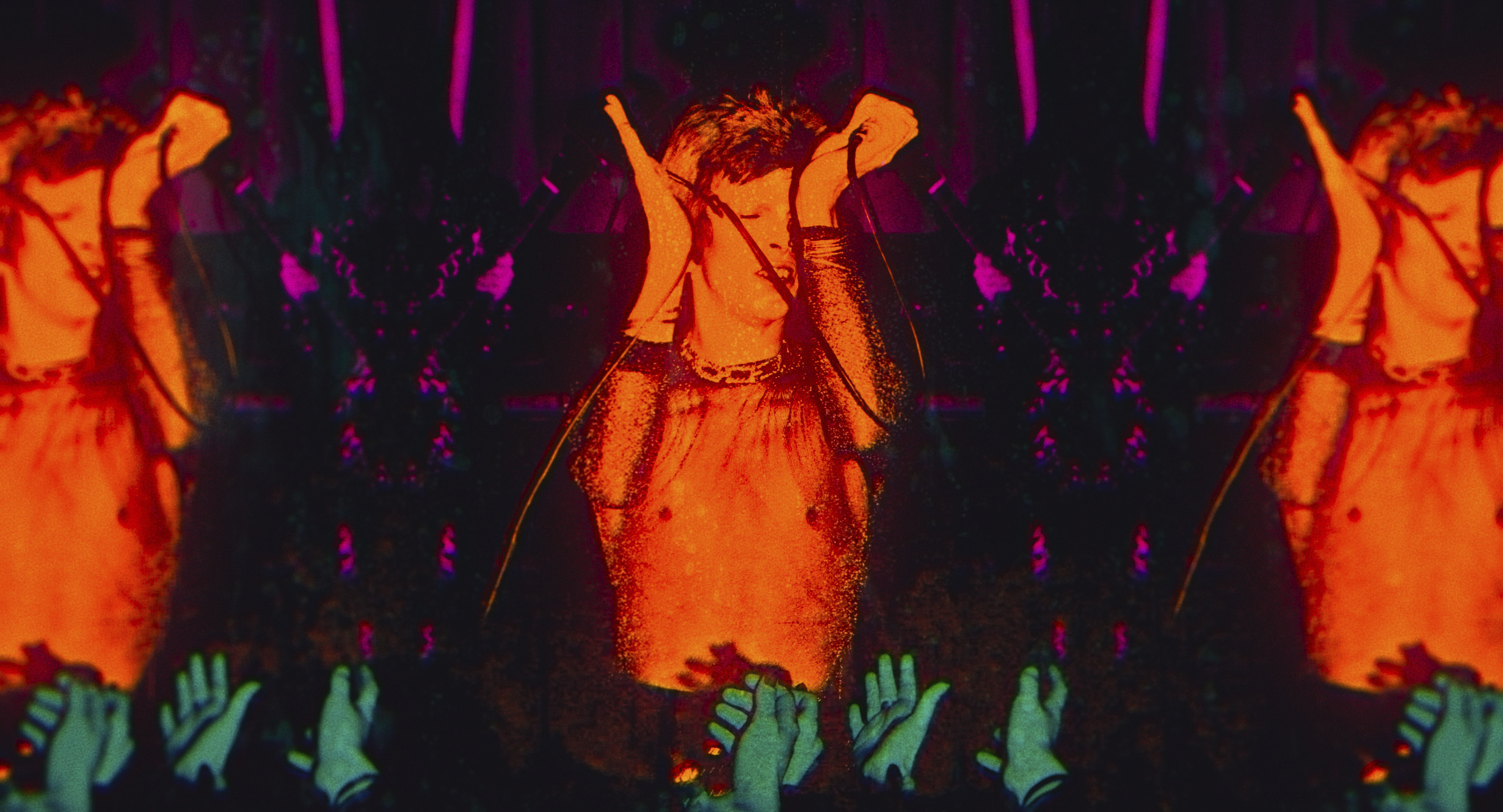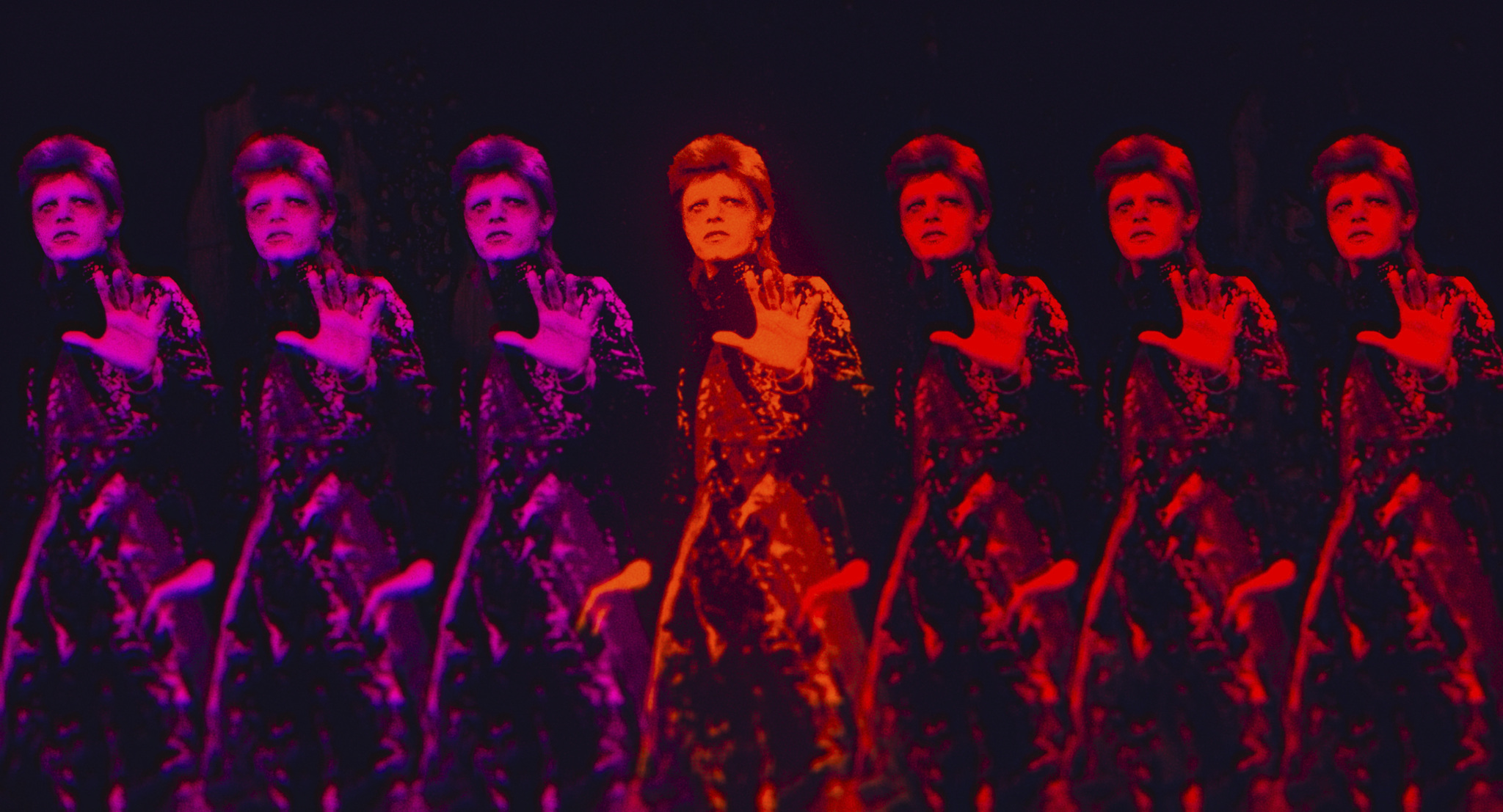
David Bowie came into Moonage Daydream director Brett Morgen’s life when the latter was just a teenager. “I don’t know which came first, Bowie or puberty,” he tells TIME over Zoom ahead of the documentary’s theatrical release on Sept. 16. “But they had the same lasting impact on my worldview.” Forty years later, Bowie once again prompted Morgen to see the world and his place in it a little differently.
In 2017, while preparing to make Moonage Daydream, a neon-soaked nonlinear joyride through Bowie’s life and career, Morgen suffered a heart attack that left him in a coma for a week. It was Bowie who provided the filmmaker, who had been given unfettered access to Bowie’s archives by the artist’s estate for the documentary, with a roadmap toward recovery. “Bowie is someone who, from the very beginning, understood how limited our time on this Earth was,” he says of the artist who died in 2016, two days before the release of his final album, Blackstar, which reflected on his impending death. “Most of us don’t arrive there until we’ve lived more days than we have in front of us and we suddenly wake up and say, Oh my god, we’re running out of time.”
Moonage Daydream isn’t a biographical film, but a philosophical one that shares Bowie’s thoughts on time, aging, and mortality through never-before-seen footage of the chameleonic singer onstage and off. (A clue that this is not your average musical documentary? It starts with Bowie quoting Friedrich Nietzsche.) “I don’t know what a ‘moonage daydream’ is per se,” Morgen admits when asked about the film’s title, a nod to the hit of the same name off Bowie’s 1972 album, The Rise and Fall of Ziggy Stardust and the Spiders From Mars. “But the fact that I don’t really know what it means is kind of the beauty of Bowie: he’s the unknowable.”
Morgen, who has made films about Jane Goodall, Kurt Cobain, and Hollywood producer Robert Evans, estimates that Bowie’s archives included more than five million assets ranging from concert outtakes to personal diaries. Going through every piece of ephemera took him seven years, but, in the end, he says he isn’t any closer to pinpointing who David Bowie was. “He can’t be defined, but he can be experienced,” he says. “The more you listen to David Bowie, the more you learn about yourself.” Below, Morgen shares the stories behind his favorite Moonage Daydream moments.
Bowie sings The Beatles
Moonage Daydream includes a previously unreleased clip of Bowie singing a medley of his early ‘70s hit “The Jean Genie” and The Beatles’ “Love Me Do” from D. A. Pennebaker’s 1979 concert documentary Ziggy Stardust and the Spiders From Mars. When Morgen discovered the footage of Bowie’s performance at London’s Hammersmith Odeon, which featured Jeff Beck on guitar, he immediately knew he had found “a holy grail for Bowie fans.”
Ziggy Stardust and the Spiders From Mars was the first documentary Morgen ever saw in theaters, and to be able to go through Penebaker’s outtakes was a spiritual experience for the director. “It is one of the greatest filmed performances of David Bowie’s career,” Morgen says of the concert, which marked the last time Bowie ever performed as his alter ego Ziggy Stardust. “And then it was put on a shelf and untouched for 40 years. What a gift to be able to share it in this way.” Only a snippet of Bowie singing the Fab Four appears in the film, but fans can hear the medley in its entirety on the film’s official soundtrack.
Bringing David Bowie’s journals to life
While living in Los Angeles in 1974, Bowie kept a journal that Morgen says was “some of the most robust and illuminating of all the ephemera I experienced.” During that period, Bowie was writing several screenplays, including one based on his 1974 album Diamond Dogs, and another about Major Tom, the wayward astronaut that Bowie first namechecked in his 1969 song “Space Oddity.” Morgen animated some of the storyboards Bowie had created for those films and used them to help visualize the moment in his film, in which Bowie talks about his relationship with his older half-brother Terry, who suffered from schizophrenia.
The journals allowed Morgen to see how Bowie saw the world, but “there was some stuff I read where, [I thought] is this a put-on, or did he really drive out into the desert in the middle of the night to look at UFOs?” Admittedly, Morgen is still unsure whether Bowie’s journals were a work of fact or fiction, “but it was utterly fascinating to explore.” Reading through them, he started to see a connection between Bowie and Kurt Cobain, whose archives he dove into for the 2015 documentary Montage of Heck. “David and Kurt had that same sort of creative energy where it had to be purged,” he says. “I’m still in awe of that sort of creativity and what people choose to do with it.”
Following David Bowie’s lead

Morgen got to see things Bowie fans could only dream of, but “the most illuminating thing” he saw in the archive was an interview the artist did with a Canadian entertainment reporter in the mid-’80s. “She sits down and it’s clear she doesn’t know anything about him,” Morgen says, but Bowie still engages with her in the moments before they go on air, asking her about her favorite books and sharing what he’s been reading. What Morgen realized from watching that interview was that Bowie “sees every moment as an opportunity for growth and for an exchange, which was really powerful,” he says. “He was always present.”
Bowie’s ability to live in the moment has led Morgen to rethink the way he lives his own life. “I don’t need to make films anymore,” he says. “When I started, I thought that I was working towards one day creating some sort of master work. That I could keep learning and improving and get there. I learned from Bowie that virtuosity is overrated.” Staring death in the face has made Morgen realize that making the perfect film no longer feels like the best use of his time. “I’ve been making films for 25 years. There are other things to do,” the father of three says. “My wife doesn’t believe me, but I kind of want to run an Airbnb. I’m serious. I’m into making experiences.”
His dream of running a rental property will have to wait, since he’s committed to making one more documentary with an iconic actor that has yet to be revealed. It won’t be another archival project. “Because of this Bowie experience I can’t do that anymore,” he says. Instead, he wants to move in with the aging Hollywood star for four months and see what happens. “I told him, ‘It’s going to be terrifying for you because you’ve never allowed anyone into your life like that. I don’t want to do it, you don’t want to do it. That’s why we need to do it,’” he says. “That was David’s influence; I realized he was always taking it all in. Most of us don’t really go through life like that, but maybe we should.”
The end credits scene
Stick around until the very end of Moonage Daydream and you’ll get a sweet sendoff from Bowie in the form of a little goodbye ditty. The final thing moviegoers hear is a bit of previously unreleased audio that was recorded for an EPK or electronic press kit he had made for the release of his 1995 album, Outside. “It was this little tag he did at the end of the recording that I just found so charming,” he says. “I have a hard time hearing that because it’s so warm.”
Morgen hopes Bowie’s final farewell won’t really feel like a goodbye, but a friendly reminder that tomorrow isn’t promised so you must live each day to the fullest. After all, that’s what Bowie would do. “I don’t think anyone goes into a David Bowie movie thinking they’ll come out feeling sort of enlightened in the same way a visit to church or temple will enlighten you,” he says. “But that’s David for you. He was one of a kind.”
More Must-Reads from TIME
- Cybersecurity Experts Are Sounding the Alarm on DOGE
- Meet the 2025 Women of the Year
- The Harsh Truth About Disability Inclusion
- Why Do More Young Adults Have Cancer?
- Colman Domingo Leads With Radical Love
- How to Get Better at Doing Things Alone
- Michelle Zauner Stares Down the Darkness
Contact us at letters@time.com



